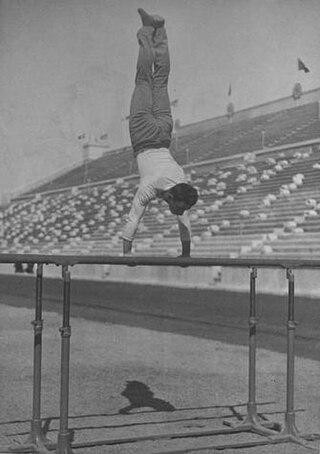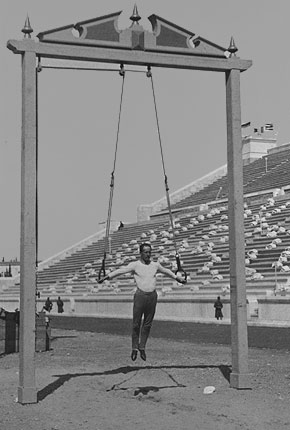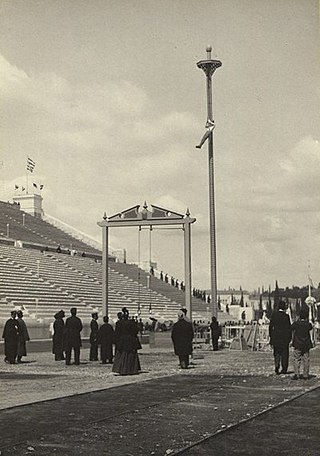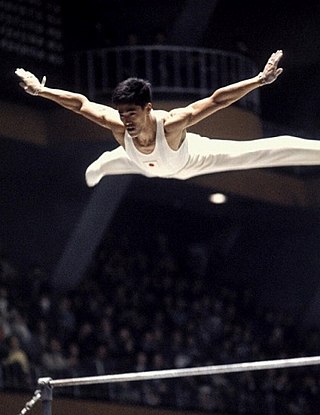
The 1896 Summer Olympics, officially known as the Games of the I Olympiad and commonly known as Athens 1896, was the first international Olympic Games held in modern history. Organised by the International Olympic Committee (IOC), which had been created by French aristocrat Pierre de Coubertin, it was held in Athens, Greece, from 6 to 15 April 1896.

At the 1896 Summer Olympics, eight gymnastics events, all for men, were contested in Panathinaiko Stadium. They were organized and prepared by the Sub-Committee for Wrestling and Gymnastics. Events took place on April 9, April 10, and April 11, 1896. There were 71 competitors from 9 nations that took part in gymnastics.

At the 1900 Summer Olympics one gymnastics event for men was contested. The competition was held on Sunday, 29 July 1900, and on Monday, 30 July 1900. There were 135 competitors from 8 nations. The top 18 places were taken by French gymnasts, of which there were more than 100. The event was won by Gustave Sandras, with Noël Bas finishing second and Lucien Démanet third. The highest-placing foreign gymnast was Jules Ducret of Switzerland, in a tie for 19th place.
At the 2004 Summer Olympics in Athens, Greece, three disciplines of gymnastics were contested: artistic gymnastics, rhythmic gymnastics and trampoline. The artistic gymnastics and trampoline events were held at the Olympic Indoor Hall and the rhythmic gymnastics events were held at the Galatsi Olympic Hall.

France competed at the 1896 Summer Olympics in Athens, Greece, from 6 to 15 April 1896. French athletes had appeared in every Summer Olympic Games of the modern era, alongside Australia, Great Britain, and Greece. France won the fourth-most gold medals with 5 and the fourth-most total medals with 11. Cycling was the sport in which the French competitors had the most success, as they completely dominated the field. The French team had 27 entries in 18 events, winning 11 medals.

Germany competed at the 1896 Summer Olympics in Athens, Greece. The Germans were the third most successful nation in terms of both gold medals and total medals (13). Gymnastics was the sport in which Germany excelled. The German team had 19 athletes. The Germans had 75 entries in 26 events, taking 13 medals.

Greece was the host nation of the 1896 Summer Olympics held in Athens. The number of Greek contestants is commonly cited as 169, but as many as 176 Greeks contested events in all nine sports. The Greeks were by far the most successful nation in terms of total medals with 47, 27 more than the United States of America. Nevertheless, their number of first-place finishes (10) was one fewer than the Americans' 11. The Greeks had 172 entries in 39 events. Only 4 events had no Greek entrants—the 400 metres and the high jump in athletics and the vault and the team horizontal bar in gymnastics.

The men's high jump was one of four jumping events on the Athletics at the 1896 Summer Olympics programme. The high jump was held on 10 April. Five competitors took part in the event, three of them Americans. Ellery Clark, who had previously won the long jump, also won this event. Garrett and Connolly tied for second place.

The men's pole vault was one of four jumping events on the Athletics at the 1896 Summer Olympics programme. Five athletes competed in the pole vault. The two Americans far outclassed the three Greeks, starting higher than the Greeks could clear and taking first and second places. Damaskos and Theodoropoulos tied for third, while Xydas took fifth.

The men's parallel bars was one of eight gymnastics events on the Gymnastics at the 1896 Summer Olympics programme. The parallel bars event was held on 10 April, the seventh gymnastics event to be held. 18 gymnasts from six nations competed, with the judges announcing Alfred Flatow as the winner and Louis Zutter as the runner-up.

The men's horizontal bar was one of eight gymnastics events on the Gymnastics at the 1896 Summer Olympics programme. It was held on 9 April, as the sixth gymnastics event. 15 athletes from four nations entered the competition. Two winners were announced, with Hermann Weingärtner winning his first individual gold medal, which was added to his two team gold medals and his three other individual medals. His countryman, Alfred Flatow, won his first individual medal.

The men's vault was one of the eight gymnastics events on the Gymnastics at the 1896 Summer Olympics programme. The third event, it was held on 9 April. 15 athletes from five nations competed. The Germans captured the gold and bronze medals, while Zutter won the silver for Switzerland.

The men's pommel horse was one of eight gymnastics events on the Gymnastics at the 1896 Summer Olympics programme. The pommel horse was the fourth event held on 9 April. 15 athletes from five nations started the pommel horse exercise. Zutter won Switzerland's first gold medal in this event, with Weingärtner taking the silver.

The men's rings was one of eight gymnastics events on the Gymnastics at the 1896 Summer Olympics programme. The fifth event, it was held on 9 April. There were eight competitors from three nations. The Greeks won the gold and bronze medals, with Hermann Weingärtner winning his fifth medal. Places 1–3 and 5 are known, but 4th place is not—any of the four athletes whose places are not known may have occupied the fourth position.

The men's rope climbing was one of eight gymnastics events on the Gymnastics at the 1896 Summer Olympics programme. The final event in the gymnastics competition, rope climbing was held on 10 April. The rope was 14 metres long, suspended from a frame. Time and style were considered in placing the competitors who reached the top and distance climbed separating those who did not make it all the way up. Five competitors entered, with the two Greeks taking top honors by being the only two to complete the climb. The German Fritz Hofmann won the bronze medal, while the weightlifting champions Viggo Jensen and Launceston Elliot finished fourth and fifth.

The men's team horizontal bar was the second of eight gymnastics events on the Gymnastics at the 1896 Summer Olympics programme. It was conducted on 9 April. Only one team, from Germany, competed.

The men's parallel bars was a gymnastics event contested as part of the Gymnastics at the 1964 Summer Olympics programme at the Tokyo Metropolitan Gymnasium. The event was held on 18, 20, and 23 October. There were 128 competitors from 29 nations, with nations in the team competition having up to 6 gymnasts and other nations entering up to 3 gymnasts. The event was won by Yukio Endo of Japan, the nation's first victory in the parallel bars after two Games with silver and bronze medals. It was the first of a four-Games gold medal streak for Japanese gymnasts in the event. Japan also took silver, with Shuji Tsurumi finishing second. Bronze went to Franco Menichelli of Italy.

The men's artistic individual all-around was an artistic gymnastics event held as part of the gymnastics programme at the 1904 Summer Olympics. It was the second time an all-around event was held at the Olympics. The competition was held on Friday, July 1, 1904 and on Saturday, July 2, 1904. One hundred and nineteen gymnasts from three nations competed. The event was won by Julius Lenhart, an Austrian gymnast living in the United States and competing under the auspices of his Philadelphia-based club. Silver went to Wilhelm Weber of Germany, with bronze to Adolf Spinnler of Switzerland. They were the first medals in the event for each of those nations, as France had swept the medals in 1900.

The men's artistic individual all-around was an artistic gymnastics event held as part of the Gymnastics at the 1912 Summer Olympics programme. The competition was held on 12 July at the Stockholm Olympic Stadium. It was the fourth appearance of the event. There were 44 competitors from 9 nations. Each nation was limited to 6 gymnasts. The event was won by Alberto Braglia of Italy, the first man to successfully defend a title in the artistic individual all-around. The bronze medalist from 1908, Louis Ségura, this time took silver. Braglia and Ségura were the first two men to win multiple medals in the event. Italian Adolfo Tunesi earned bronze.

The men's parallel bars competition was one of eight events for male competitors of the artistic gymnastics discipline contested in the gymnastics at the 2004 Summer Olympics in Athens. The qualification and final rounds took place on August 14 and August 23 at the Olympic Indoor Hall. There were 81 competitors from 31 nations, with nations competing in the team event having up to 5 gymnasts and other nations having up to 2 gymnasts. The event was won by Valeriy Honcharov of Ukraine, the nation's second victory in the parallel bars. Hiroyuki Tomita took silver, putting Japan above the Soviet Union on the all-time medal table for the event. Li Xiaopeng of China became the seventh man to win multiple parallel bars medals with his bronze adding to his 2000 gold.



















